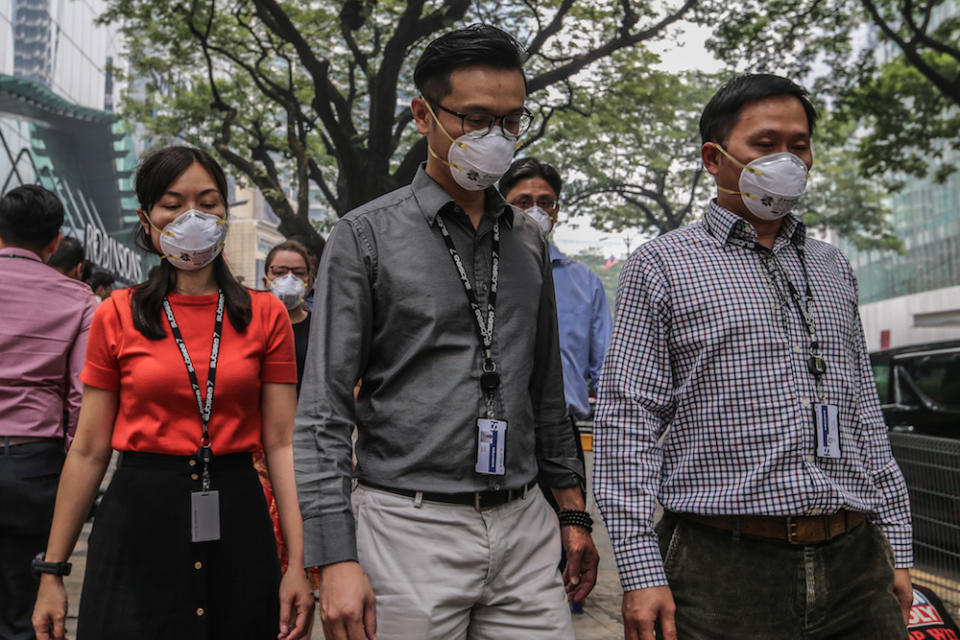MoH: Cases of asthma, pink eye steadily on the rise amid haze season

KUALA LUMPUR, Sept 19 — The Ministry of Health (MoH) revealed today that cases of haze-related illnesses have steadily risen in the past few weeks, due to the prolonged haze season.
Its director-general Datuk Dr Noor Hisham Abdullah said there has been an increase of nearly 16 per cent of asthma cases reported last week at 31 of its “sentinel clinics” — clinics that are indicators of the presence of such diseases.

There were 1,375 cases reported compared to the average of 1,187 cases in the past 10 weeks between June 30 and September 7.
In addition, there was a nearly 25 per cent rise in conjunctivitis, also called “pink eye”, cases in the same period (from 253 to 317 cases).

However, the cases for upper respiratory tract infections (URTI) had fallen last week by over 17 per cent compared to the same period (from 7,551 to 6,245 cases).

He said based on Air Pollutant Index (API) readings from 68 air quality monitoring stations under the Environmental Department, as of 3pm today there are 26 stations at moderate, 36 at unhealthy, and six at very unhealthy levels.
“The ministry will continue to monitor the train of illnesses. The public, especially high risk grounds including children, the elderly, smokers, those constantly exposed to outside air, and those suffering from asthma, bronchitis, pneumonia, heart disease, and allergies, are advised to take the necessary steps to reduce their chances at being affected by the haze.
“These include reducing physical activity outside of home as it can increase the breathing rate which further increases the risk of haze-related illnesses, and postponing any outdoor physical activities if API readings exceed 100, per the advice of the National Haze Action Plan,” he said.
He also advised for windows to be constantly closed so as to prevent haze from entering homes or buildings, and if possible to turn on high-performance air-conditioners and air filters which can trap fine particles and prevent air pollution from getting in.
“Avoid activities which can increase air pollution in homes or buildings, by not smoking and ensuring the interior is always kept clean. Drink sufficient water, at least eight glasses daily, to ensure bodily hydration.
“Use face masks when conducting outdoor activities, and constantly wash the face and any body parts exposed to the haze. Monitor the health of little children and those with respiratory and heart conditions, as they are more easily affected by exposure to haze,” Dr Noor Hisham said.
He also advised air-conditioner users to ensure their appliances run on cycle mood, and to keep windows closed whenever driving. Those experiencing signs or symptoms of cough, cold, asthma, eye pain, and lung infections should proceed to the nearest healthcare facility for further examination and treatment.
Earlier this week, the Health Ministry had disclosed that the number of patients seeking treatment for eye infections nationwide have risen between 20 and 30 per cent in the last one month.
The ministry’s national head of ophthalmology services Dr Nor Fariza Ngah said there could be a link between the increase in eye infection cases and patients with asthma and those with respiratory diseases.
Allergy and respiratory complaints have also increased, government doctors said since thick smoke ― believed due to forest fires in Indonesia ― enveloped Malaysia with no signs of abatement any time soon.
Last Friday, Deputy Health Minister Dr Lee Boon Chye said the ministry’s initial findings of haze effects on health has indicated certain illnesses have increased by as much as 30 to 40 per cent.
Related Articles Haze forces 1,140 schools in Sarawak, Perak to close Kedah MB urges paddy farmers to minimise burning activities as haze worsens The Haze is the climate emergency! — Khor Swee Kheng, Amar Singh-HSS, Darshan Joshi


